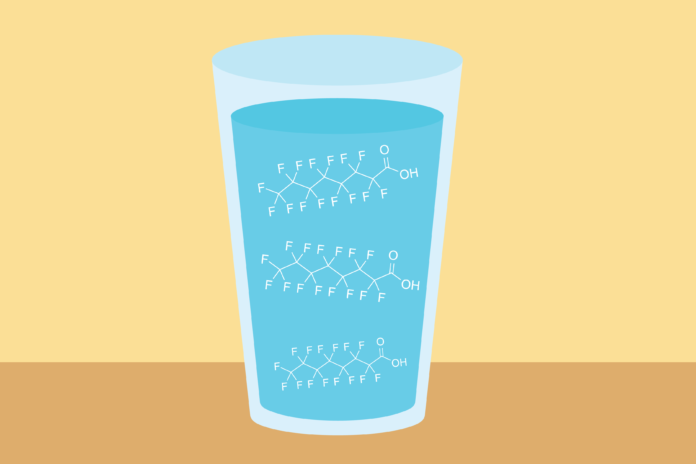It’s time for the Biden Administration to protect the American people from “forever chemicals,” forever
Teflon. An invention as American as apple pie, it has been used in everything from coating pipes in the Manhattan Project to everyday use in kitchens to coat non-stick pans. Teflon was so popular that in the 1980s that former president Ronald Reagan was affectionately nicknamed “The Teflon President,” because no scandals ever seemed to stick to him. Teflon’s “non-stick” ability was attributable to a surfactant called Perfluorooctanoic Acid (PFOA), which was only fully phased out of use by Dupont in 2014.
Today, it is common knowledge that PFOA has been linked to a vast amount of human health impacts, including kidney, testicular, liver and pancreatic cancer. Recent studies have also indicated that it is found in nearly every living thing on Earth, even in the most remote locations. You’re probably wondering: How is this even possible? How did this harmful chemical go undetected for so long?
The easy answer is it didn’t. Dupont, the company who makes Teflon, knew that PFOAs had potentially severe health impacts from their own study on dogs and rabbits, by 1961. Over the next few decades, 3M Company and Dupont did a series of internal studies, which linked PFOAs to birth defects, testicular cancer, pancreatic cancer and liver tumors in various species. Ultimately though, Dupont argued that they had no reason to believe that there were any adverse human impacts. This was fairly convenient considering they knew that there were high concentrations of the chemical in the blood of their workers at the Washington Works Plant since 1984. In fact, between 1951 and 2003, 1.7 million pounds of PFOAs were released into the environment around the plant meaning that the surrounding community was also likely impacted. The bottom line is that Dupont knew that PFOAs were likely dangerous just 10 years after they began using them, yet never informed the federal government or the Environmental Protection Agency (EPA).
It is likely that PFOAs toxicity might’ve gone undetected to the present if it hadn’t been for a persistent farmer named Wilbur Tennant. In the late 1990s, Tennant, whose cattle had been dying mysteriously, blamed Dupont’s new landfill which had opened adjacent to his land. Unable to find legal help within Parkersburg, Tennant resorted to reaching out to Robert Bilott, a corporate chemical defense lawyer whose grandmother lived in Parkersburg. Ultimately, Bilott was able to win a settlement for the Tennants, but was unsatisfied with the outcome as it allowed Dupont to continue to pollute the local community.
Bilott, among others, went on to sue Dupont in a class action lawsuit which Dupont settled on the basis that an independent science board would look into the toxicity of the chemical. With 70,000 participants involved in one of the largest epidemiological studies in history, the board took 7 years and concluded that there was a probable link between PFOA and a plethora of cancers. In response to this, Dupont rejected the evidence from the independent review and tried to fight every individual lawsuit on a person-to-person case. Many of the plaintiffs were terminally ill, and it was likely that Dupont was banking on the fact that many people would die or give up before getting a verdict. After several individual cases (and losses), the company settled with the entire class for $670 million dollars, less than what the company makes on Teflon in a single year.
To this day, the EPA has only marked PFOAs as a “chemical of concern,” and cannot enforce any guidelines or health suggestions set by their review of the chemical. Bilott’s battle with PFOAs illustrate the greater problem with the EPA’s review process for unregulated chemicals. The loophole which allowed Dupont and 3M to continue to pollute the entire country for decades essentially relied on self regulation which has historically never worked.
Additionally, PFOAs are only one of many chemicals that fall under the category of “forever chemicals,” named for their persistence in both the environment and the human body. There are dozens of other chemicals that fall under this category, mostly unregulated, that must be a priority for the Biden administration’s EPA. Despite increasing public outcry, change is slow. It’s not a good sign that President Joe Biden’s EPA transition team included an ex-Dupont consultant, but there have been significant strides towards increased regulation.
“I am cautiously optimistic that, with increasing public awareness of the global PFA [PFOAs] “Forever Chemicals” public health threat, we may finally see significant steps taken at the national level to effectively address the issue and to make sure that those who actually caused this problem are held responsible,” remarked Bilott earlier this month over email.
If you are interested in learning more about PFOAs, Bilott’s novel “Exposure” chronicles his decades long legal battle around the chemical or you can see the film “Dark Waters” starring actor Mark Ruffalo. Want to know more about forever chemicals or what’s in your water? Check out the Environmental Working Group’s Tap Water Database. It is essential for the health of our communities that the Biden Administration implements strong regulations around the production and use of “forever chemicals,” like PFOA.
Written by: Joe Sweeney — jmsweeney@ucdavis.edu
Disclaimer: The views and opinions expressed by individual columnists belong to the columnists alone and do not necessarily indicate the views and opinions held by The California Aggie.





